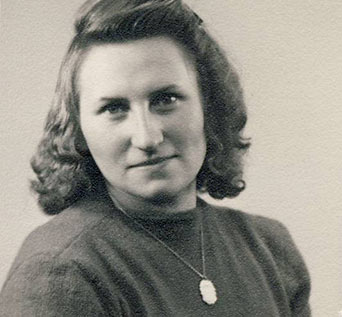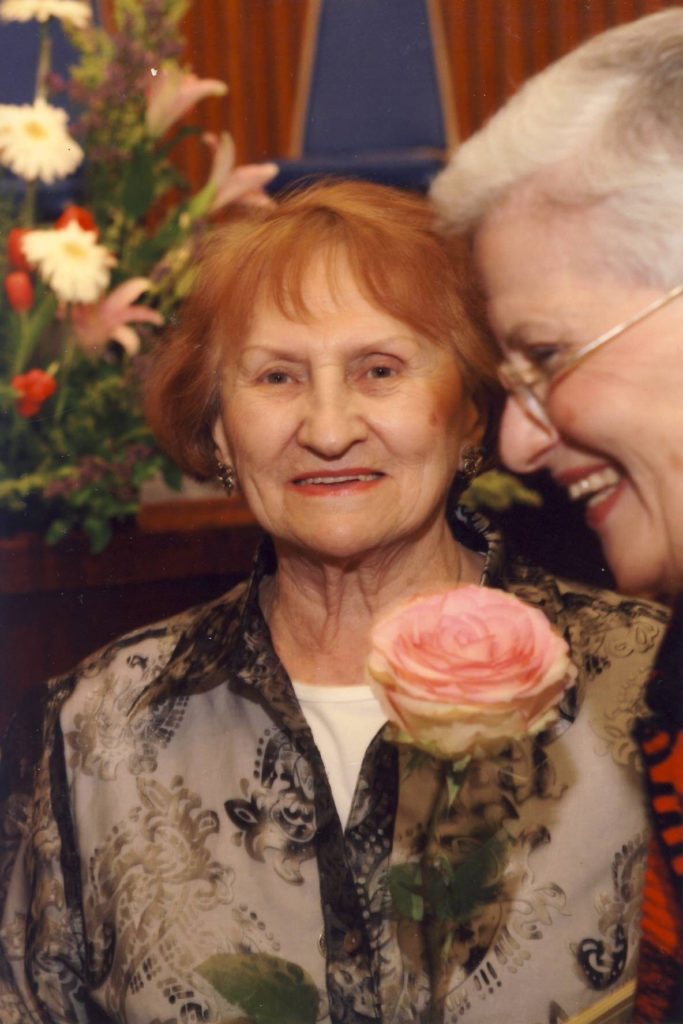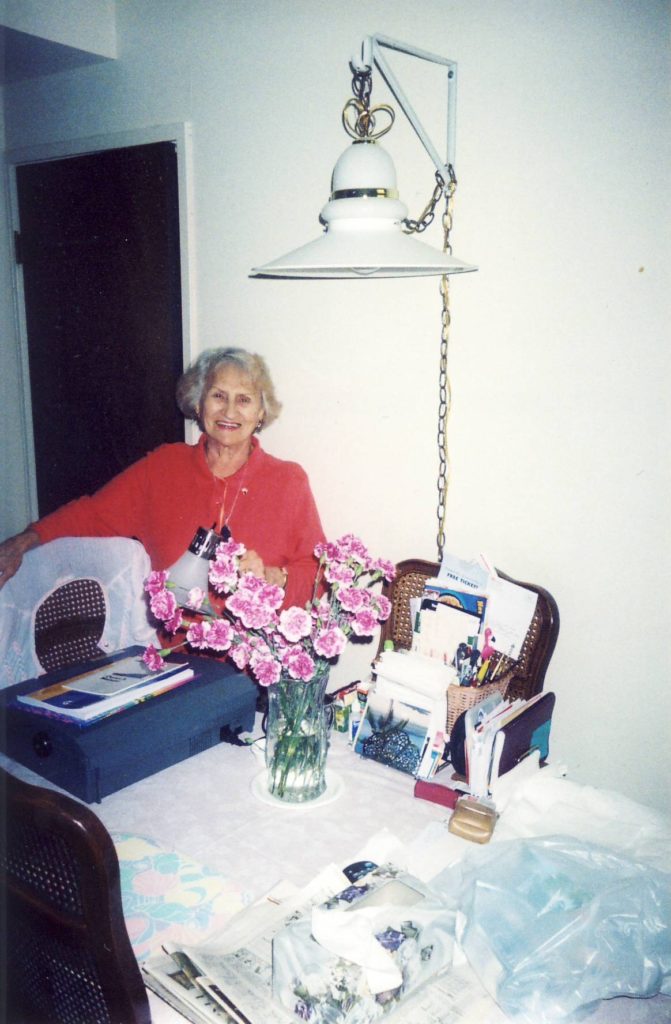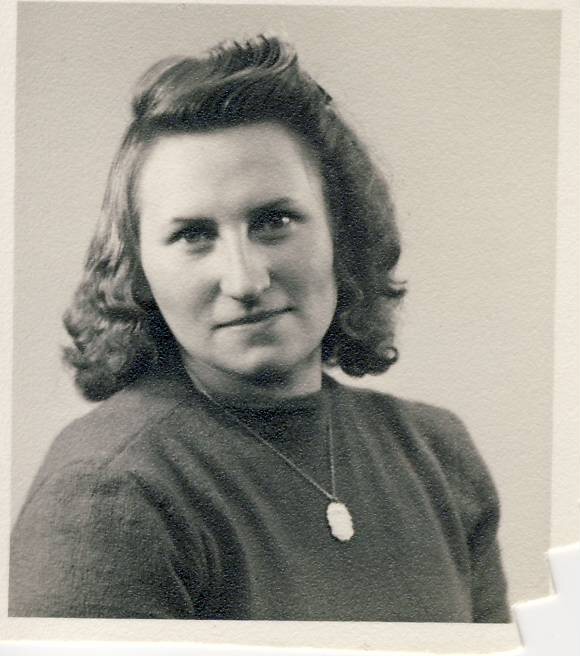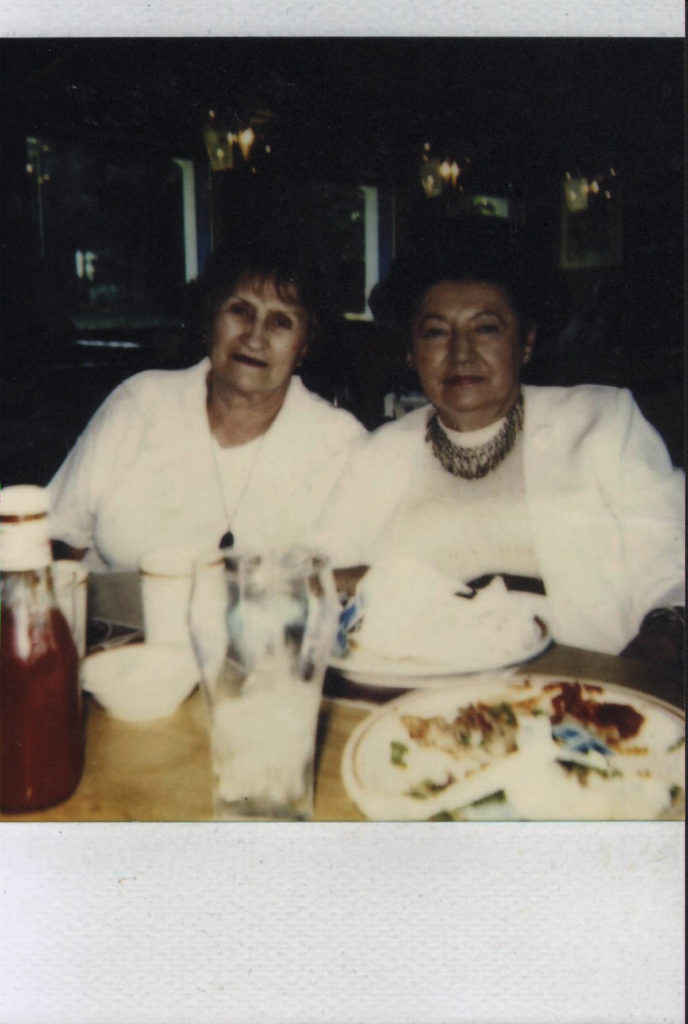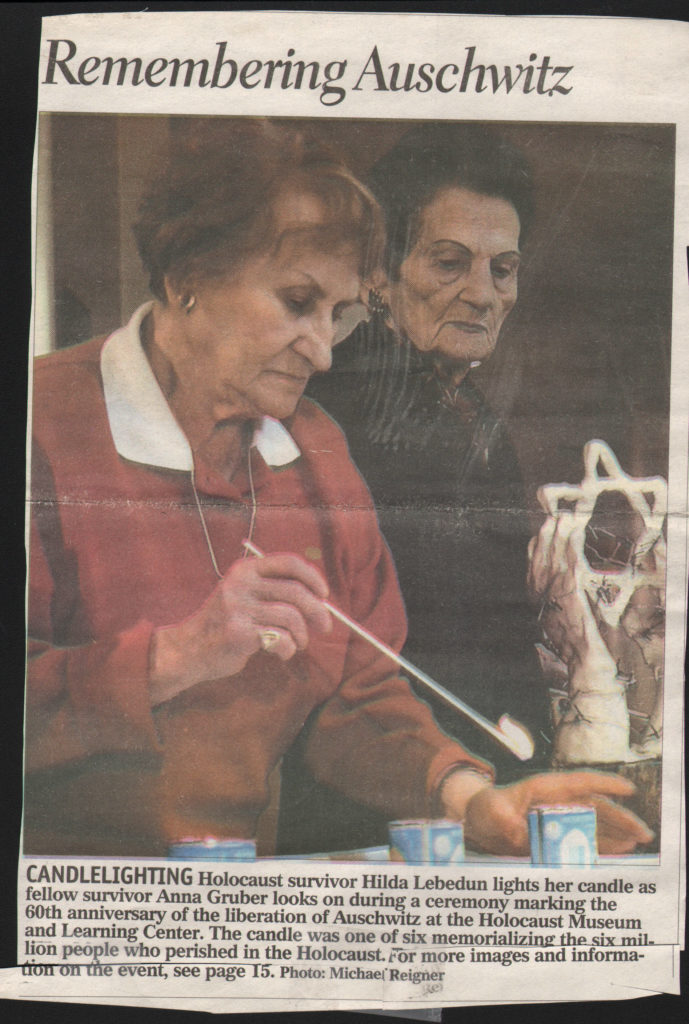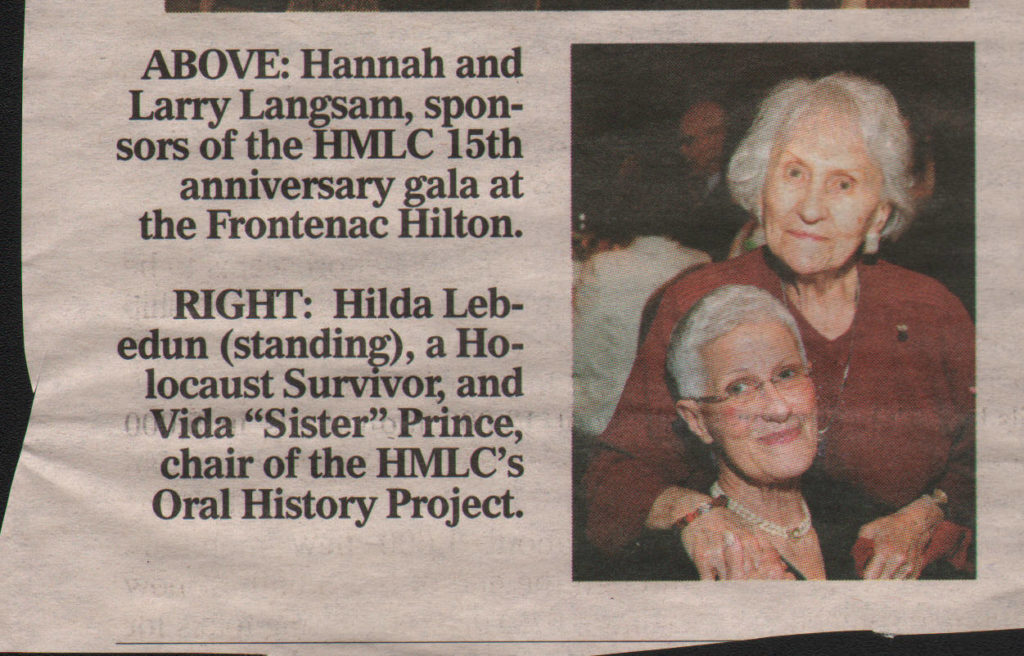BERNSTEIN: How was it for you when you saw your mother-in-law and two sisters-in-law come out?
LEBEDUN: Oh, it was terrible, just terrible. You see, when they took my – my mother-in-law was older, much older than my mother – and they didn’t want to take the old, old people, the older people the first wave, the younger ones they took. If they would have known my parents age, they wouldn’t have taken them because they looked so young. And when they came, it was about the 10th transport and my two sisters-in-law didn’t want to leave without their mother. And they were back in the camp in Zilina, and in between times – between the fall of ’42 and the spring of ’43, they were trying desperately to build up more camp and housing facilities for more people. And when I left, I found out later, my sisters-in-law and my mother-in-law moved from the town for the south, to southern Slovakia, and that’s why they got to them a little later. When they came in, and I was on the ramp – we who were there already – we had to do duty at the ramp and I saw them coming down and I said to myself, “Oh my God, I cannot make as though I know them, that they are family,” because there were SS around. But when they were pushed over and the selection was over as to who goes left and who goes right and they were on the side where we were, I went from the back and I squeezed their hands and I said, “Don’t act like we are related but just that you know me. Oh my God, where did they get you from?” So then she said to me very sadly, “In southern Slovakia and neither one wanted to leave me.”
BERNSTEIN: So they would have taken the daughters but not the mother?
LEBEDUN: First, yes. But they did not have enough room, as much as they wanted to exterminate the people, and they were very cautious not to let the rest of the world know that we are going to vernichtung, to annihilation, that this is not just a working camp but that it’s an annihilation camp, you know.
BERNSTEIN: They made it through the first selection?
LEBEDUN: Yes, when they got to the ramp from the train, but over the winter I used to smuggle charcoal and aspirin – aspirin was world known under a different name, but Ina (the doctor), when she saw me after the roll call at dusk, she said, “You know, someday you are going to be shot.” I was careful. I would say, “I need…,” and she would say, “Yes, I know what you need. You need pills and charcoal, and what else?”
BERNSTEIN: What was charcoal for?
LEBEDUN: Charcoal was for the dysentery. God, the dysentery we got. After the initial typhoid fever, then we got stomach type typhoid and that’s dysentery. Then one went to the bathroom with blood and that was the most debilitating one.
BERNSTEIN: Was there another selection after this?
LEBEDUN: Oh, yes. The first selection was, as I started to say before, in the snow. But they had many places to get them together besides Zilina, we found out then. And they had to transport them. They couldn’t keep them there, and there was no place to take them into. Auschwitz-Birkenau was small. They built more camps. They built Treblinka, they built Buna Vercke, and some other camps behind the barbed wires around where we were in Birkenau, and the whole thing was called Auschwitz-Birkenau.
And no sooner did they have a barrack ready, then the newcomers came. They shipped thousands and thousands. And after the first selection, they were taken. And I saw them in – they put them in trucks and the crematoria, the room where they were gassed, was built in such a mad fashion that the windows were like chutes. They opened the back of the truck and they were just pushed down through that chute into that big room that looked like a sauna, a shower – with several heads of shower. And when they had so many people coming in and coming in, and they didn’t have that zyklon 11 or 12 was the gas they used. Then, you know, the body gets unconscious and a lot of live people they used to shove in the ovens. And they were found out later that there was a man and a woman and a child – they put them on those big shovels which were operated by gas and the shovel pushed them in the oven, into the flames.
BERNSTEIN: After they were gassed?
LEBEDUN: After they were sort of gassed, but they were not dead. And that’s when I thanked God that when my mother and my two brothers and all the others – in the beginning it looked like a huge room where there were showers and there was enough gas that it took about 10 minutes and one suffocated.
BERNSTEIN: They used gas and then put them in the oven? But they didn’t have enough gas?
LEBEDUN: They didn’t have enough gas later on. Then that wasn’t enough. The huge crematoria were not enough. Then they built trenches and they used to take the ones which were sort of half-gassed. They were like on a platform, and they raised the platform up to the roof and tilted the platform and they got back into the trucks and the trucks opened the back gate and they were pushed down into the flames into the trenches. And that’s when we heard them – the screams because a body which is unconscious, for whatever reason, when one is put in flames, in heat, it comes through. I saw the crematoria. I begged, you know. I had to see it for myself. And I saw the very religious Jews, the men in tefillin and tallit standing there and praying, waiting for their next to be gassed. And sometimes I started losing faith after I saw that. (CRYING) What did we do so terribly bad that He is punishing us so much? And they were standing there and praying. And the little children were holding them by their trousers and the mothers. I cannot pinpoint when I started to have faith again.
And the crematoria flames could be seen in the distance, and one could see the smoke. It was a kind of funny smoke, kind of a pale gray type of smoke, not too pale but kind of irridescent when the sun shown through it. And we used to stand there and look at those flames and smoke, and sometimes I imagined I saw outlines and faces, “That’s my mother’s face and that’s my brother’s face. That’s the face I saw on the ramp, and in the smoke the same thing.” (CRYING)
And then later on, towards the fall of ’43, they used to bayonet the little kids, the Jewish kids who came. You know, the SS used to laugh at their wriggling and screaming. (SOBBING) They did this in front of us – they didn’t care anymore.
BERNSTEIN: They would shoot the little kids?
LEBEDUN: No, they would stick a bayonet through them. They said, “There is another Jew dying.”
BERNSTEIN: And a bayonet was like a knife?
LEBEDUN: A knife. On the gun they had bayonets. I saw them do it.
BERNSTEIN: When you were at Birkenau – you were there from September of ’42 till about September of ’44?
LEBEDUN: I was there until about November of ’44, I think – either October or November. Time had no meaning to us.
BERNSTEIN: What other jobs did you have?
LEBEDUN: I was also for a while in charge of the barrack because the one who was in charge of the barrack got sick and died, and I had 300 political prisoners in that same work unit as the 400 – 350 because there were 750 when we got more political prisoners. They were still on the – they call it “the good side, not the Jewish side.” Aryan are the Germans, you know, the better race. And because the commandant who was in charge of the commando, the special commando, the girls who were working with the newcomers’ luggage and sorting the clothes. Some of them the SS took, some of them went to Germany, and then some of them went to us, and they didn’t have enough uniforms, the striped ones, so we just got a dress. If it was thin or short or long, it didn’t matter – a dress. But the better ones they packed and sent to Germany. And when the new political prisoners used to come and we were still on the Aryan side, because we Jews were non-people.
My commando was on the other side and on that side was also the sick bay and a couple of immediate officers for the Germans. I got 300 political prisoners – women – hard core women. They took less of the Jews. They reduced the Jews from 750 to 400 and got 300 Polish girls working in the same commando. They thought these girls would tell on the Jews how much the Jews smuggle in, but they quickly learned to smuggle even more than the Jews did because they were already by that time in prison and they knew more about survival than we did. And somehow they liked me because I tried to be fair and make no differences. I told them when I saw the Polish woman’s beating on one of my girls, I said, “Why are you hitting her? You know, when we die, you’re going to die the same way we are. She didn’t do anything to you.” The woman said, “She stepped on my foot and she doesn’t have to step on my foot, that dirty Jew.” And I said, “Oh yeah, and what are you?” Oh, I used to be so mad at them. I said, “You believe in Jesus Christ, and you pray every night and your prized possession is a found rosary, that you can say your prayers? Jesus didn’t want you to be a hypocrite. She has a soul just like you, and you have a soul just as she. We are in the same mess together and if we don’t watch out for one another, we’re never going to get out of it.”
BERNSTEIN: What did your job as head of the barracks entail? What did you have to do?
LEBEDUN: To see that everybody marched out to work, to see that the scribe gave the right report, to see that my barrack was clean – clean – we finally got shovels to shovel the dirt into buckets and we used to take them behind the latrines and empty them. It was forever raining there and snowing that winter. In summer there was the worst place around Auschwitz, there were just swamps where they put us and it was just a terrible place. They knew why they were putting us there. They knew that if they didn’t kill us, the weather and the illness would kill us. And we were hard between one another because many years before I was told that suffering and deprivation show the character of a human. And I finally saw what hunger can do to people. I saw when they brought mothers there with daughters. They didn’t separate them anymore. And I saw a mother stealing bread from her daughter. I said, “My God, how can you do that? I just saw you taking the piece of bread your daughter had.” Her reply, “I want to live too.” I said, “What kind of mother are you?” I saw humanity there I never thought existed. I said to my sister, “If that would be our mother, she would have starved to death, we would have had the food.” And she looked at me and she said, “What do you know? You come from a beautiful home and you were not in a ghetto like I was. I want to live too.”
BERNSTEIN: These were political prisoners?
LEBEDUN: No, these were Jewish people – Jewish people, supposedly very religious people from Poland who went through misery in the ghettos. I never could understand, up to this day, that sometimes what this type of deprivation can do to a human being.
BERNSTEIN: Did your sister’s job change?
LEBEDUN: No, she had the same job the whole time. She fell in the shower over there – they even put showers there – and broke her collar bone, and the commandant who was in charge of them took her to the sick bay and they had it set and put in a sling. And he marched in because he hated the commander in our camp because he said, “They don’t give you enough water to shower and you stink.” He used to say that in the beginning. “I have to do something about it. I don’t want to get sick and my SS people don’t want to get sick working with you who stink so much and have so many lice.” So he had there facilities to delouse them and he had showers built, they could shower. And he saw that there was soap and clothing to change. “Change to whatever you want to change to, but don’t take the very silky flimsy stuff because they will fight with me about it,” he said. But he came in on his motorcycle and I was standing there expecting my commando and my commando is not there and I said, “Oh my God, what happened?” And I saw somebody on a motorcycle and they were talking and talking. I couldn’t understand what they were saying, and my sister was always in the front row, marching the first ten in the front row. And I saw that her sleeve is hanging down and her arm didn’t bend right. I heard him say, “Sieg Heil” and then he went back on his motorcycle. So we had to stand roll call there by the gate because they came so late and I was just looking at my sister and she said, “Don’t worry.”
When we were allowed to disband and dismantle, I said, “What happened?” She said, “I fell and broke my collar bone and he had it set. And I told him that I was finished and to kill me now. You have the gun, shoot me, because they will send me to the gas chambers.” And he said, “No they won’t. You are a good worker and you sing me pretty German songs and you have a good voice. I won’t let you die, not yet,” he said. “I’ll go with you. I will have it set and I will dare if they take you out, and I will see that you come back tomorrow morning. If you don’t come back tomorrow morning, I will go to Hitler himself. I hate those people over there!”
BERNSTEIN: So he protected her?
LEBEDUN: He protected her. And her collar bone healed wrong and when we got to Sweden, they wanted to rebreak it and reset it, but my sister said it didn’t bother her and she wouldn’t wear off-the-shoulder dresses. But he saved her life. You see, it was just meant to be.
BERNSTEIN: So, what happened? You were there until November of 1944. Another thing – you said you got sick with typhoid when you were there.
LEBEDUN: Oh, but my sister was not sick and it was so terrible, and she finally ran across one evening, and she told Ina, the doctor, “Hilda is sick. I think she has typhoid. She had a high fever.” Ina asked if she could bring me over by smuggling me in between the Polish girls. So, I was in the sick bay in between the Polish girls and she was pushing into me all kind of pills. I don’t even know what. And my fever was so high that I had no saliva in my mouth and she was coming specially to give me water. And you couldn’t see my teeth. The saliva was black and all caked on. My sister used to come after work and talk to me and shake me, “Hilda, Hilda.” And I was calling, “Selma, Selma, mother, mother,” and other names. And she said, “It’s me, I’m here, I’m here. I’m holding you. I kissed you. I am shaking you because you didn’t recognize me.” I was just calling and screaming so much. And Ina told me later on that she gave me some kind of a shot to calm me down so they wouldn’t shoot me because when they came for inspection every day, anyone who was still very sick, even the Polish political prisoners, went into the gas chambers.
BERNSTEIN: How long did it take you to get over the typhoid?
LEBEDUN: Oh, I don’t remember. I was in the revere (that’s what sick bay was called) two weeks, I think. And I got better, little by little, thanks to her (Ina, the doctor), because she gave me all kinds of pills and things. And before I was discharged, there was a selection on the Polish sick bay. I was on the bottom of the triple decker and I was feeling a little better and was more coherent. I couldn’t stand up or walk because I completely lost my equilibrium. And I remember my sister smuggled in a pair of men’s pajamas, small ones with pockets. And she told me I had to get up during the day when it was safe and, “Stick your hands in your pockets and try to walk. Suppose there is a selection and they tell you to walk out of here, then what’s going to happen with me? I’m going to put myself into the sick bay and be a part of the next batch.”
So, I tried to walk and I couldn’t. I fell down, I picked myself up and I held on to the sides and I stuck my hands in the pockets and it was hard to get my equilibrium back. One morning Ina came in and asked, “Hilda, are you listening to me?” I said, “Yes.” She said, “There is going to be a selection, but you don’t have to walk out. I want you to leave right now, up to the very back part of this room. I cannot help you because I have to run out. Get yourself up to the very top by yourself. Don’t ask me how you are going to do it. You have got to do it because that’s the place he’s not going to look too much, Mengele.”
I don’t know how I got up there because nobody was there to help me. They were still standing roll calls. I got myself up there by myself and I was just lying there and he came with the riding stick, “Who is up there? Show me your face.” And I moved over. And he said to her, “How long is she here?” And she said, “Oh, just a couple of days.” He said, “Just a couple of days, I’ll give her a couple of more but if she’s not out of here, she goes.” And I heard that. I was lucky because they took a couple other girls who were there. “Show me your face – she goes!” And they came and dragged her out and she was gone. And she was a Polish political prisoner.
BERNSTEIN: And you had been there longer than a couple of days?
LEBEDUN: Yes, thanks to Ina – she hid me. I wouldn’t get down from that third bed after the danger was over, but I got up there, I don’t know how. I was still there and after a long time Ina came and said, “Hilda, where are you?” I said, “I’m up here and I cannot get down. I tried but I get so dizzy, I’m going to fall. I’m afraid.” She said, “Yah, I know.” So she helped me down.
About two days later I was kind of toddling around and I was trying to get – then someone brought me a pajama bottom, a little different, but she put it on me and some kind of slippers she brought me. And Ina said, “You’ve got to go out of the barrack so you can get some color,” when my fever left, “because I won’t be able to keep you here too long. I can put you in another barrack where somebody will hide you for a while, but that’s all I can do. You have to start walking.”
One afternoon when there was a sunny day, I was sitting outside in the sun and somebody said, “Danger, danger, danger. The SS is going through the camp.” There was no place to go. I could not go back to the barrack because it was far away. There was only one place – to the latrine. And there was a plank, not very wide to walk on. And I thought, “Oh my God, if I can get to the latrine, I’m safe, but how am I going to get over that plank? I haven’t done that yet.” But you see, in danger again, I got myself to that plank, got myself into the latrine and there were lots of other people there. And he came and peeked in, “Anybody sick here?” “No, no, nein.” So he left saying, “Verstunkene, miserable versauten Juden.” Miserable, stinking, lousy Jews. “Verdammen,” damned. One time he said, after the selection (the very first time, as a matter of fact). In that snow we were naked and shivering, and there we were standing, those of us who were living, and others were already in trucks and crying and screaming and some of the men recognized their mothers, their wives, their daughters, screaming and crying. “Mach schnell, mach schnell (move, move, move; quick, quick, quick).” And he stands there and says to the commandant, Mengele says, “Isn’t that beautiful? Where is their God damned Jewish God while we are killing them like this? Where is that verflucht Juden God? Where is that verflucht Juden God now?”
BERNSTEIN: What does mean?
LEBEDUN: The verflucht Juden God means their damned Jewish God. I heard it – I was in the first row. I always was in the first row because we Slovakian girls were always in the first row. We lost some that time.
And we came back to the camp. We trotted through that snow and mud and we were crying and screaming…


